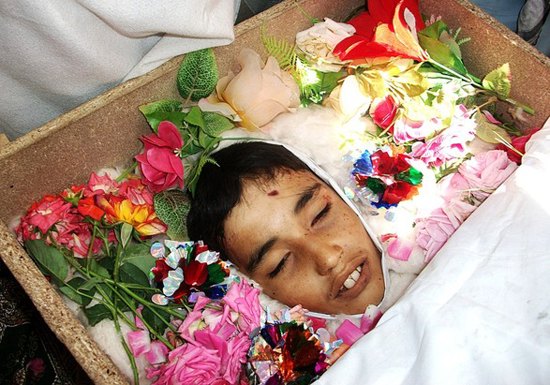Afghan officials accused NATO-led troops of killing two school boys in central Afghanistan on Saturday after a patrol came under fire by Taliban insurgents, but foreign troops said the circumstances were unclear.

The body of a child lies in a coffin decorated with flowers in Khost province on April 20, 2010. Four children were killed April 19 in crossfire between foreign soldiers and insurgents in eastern Afghanistan, the education ministry said on April 20. (Photo: Getty Images)
Civilian casualties caused by international troops while fighting insurgents are an emotive issue in Afghanistan, causing friction between President Hamid Karzai's government and its Western allies.
A statement released by the NATO-led International Security Assistance Force (ISAF) said two civilians had possibly been killed in the Maidan Shahr district of Wardak province, west of Kabul, when insurgents attacked the patrol.
However, it did not say whether they were killed by ISAF troops or by insurgents.
"During the attack, three Afghan citizens on a motorcycle entered the engagement area. Two of them fell off the vehicle and were taken away by local villagers," ISAF said.
It said their condition could not be determined before they were taken away. The incident was under investigation, ISAF said.
However, Shahedullah Shahed, a spokesman for the Wardak governor, said ISAF troops had fired indiscriminately and killed two students about 50 km (30 miles) west of Kabul when a rocket was fired at their convoy.
He said the rocket was apparently fired by the Taliban.
Wardak police chief Nawas Haqyar said ISAF troops were returning fire and mistakenly killed the students.
"Our investigation shows that the teenage boys were killed by ISAF bullets, not Taliban," he told Reuters.
The attack prompted a brief demonstration by angry villagers, demanding an explanation from NATO forces over the killing.
A mid-year U.N. report said civilian casualties had risen by 31 percent in the first six months of 2010 compared with the same period last year.
More than three-quarters of the casualties were blamed on insurgents. The number attributed to foreign forces dropped to 12 percent, from 30 percent in same period last year, mainly because of a significant drop in those caused by aerial strikes after NATO commanders tightened engagement rules.
(Reporting by Hamid Shalizi and Mustafa Andaleb)



